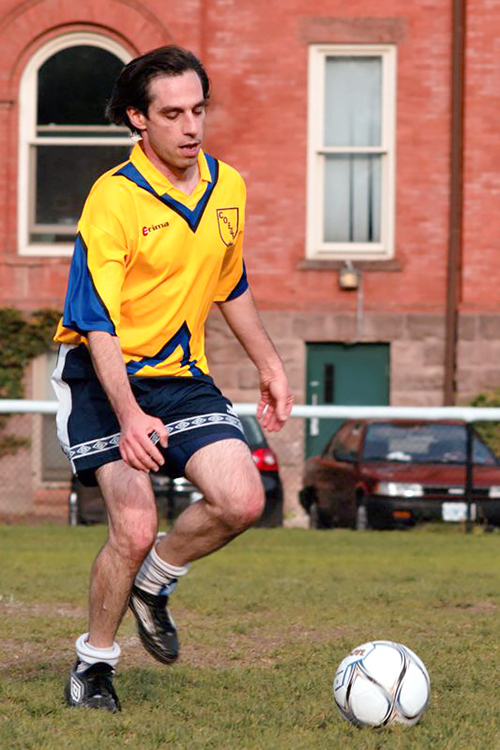As you watch the World Cup in Qatar and cheer for (or cry for) your team, you’re really watching another chapter of international history unfold that’s intertwined with the ‘beautiful game.’
And it’s that rich history that Paul Cohen can’t wait to share this January in his upcoming third-year history course, Soccer: The History of the World’s Game.
“We’re not reproducing the traditional narrative of sports writing, which considers sport to be a question of scores, athletic accomplishments, statistics or heroic deeds and failures,” says Cohen, an associate professor in the Faculty of Arts & Science’s Department of History.

“The course is an attempt to look at the sport, not as a fan, but as a historian, and to ask certain questions: Where did the sport come from? Why was it created? What are the historical genealogies that connect modern football to past games, leisure activities or cultural forms?
“As well, the course proposes that we can't understand sport, its history and importance, without reference to historical context. By the same token, soccer has a great deal to teach us about other things.”
Though its origins could be traced back much further, organized soccer originated in the British Isles in the mid-19th century. The English established rules that are still followed today, such as fouls for tripping opponents and for touching the ball with hands.
The sport grew, moving from being played by students in elite schools and working-class men in growing industrializing British cities in the mid-19th century, to spreading across Britain and the British empire enroute to becoming world’s most popular sport.
“It demands historical explanation,” says Cohen. “How did this leisure activity come to take on such enormous importance?”
Cohen’s course will also explore supporter culture — people’s religious devotion to soccer and the impact it has had on people’s lives.
The Netherlands’ national team boasts a particularly dedicated fan base, with up to 20,000 fans regularly traveling for international matches. Dutch supporters take part in elaborate fan practices that encompass much more than football.
Brass bands supply the music for boisterous outdoor parties before matches, with long parades of dancing fans dressed in brightly orange-colored costumes marching to stadiums before the opening whistle.
Shifting from parties to politics, a number of dictators have used soccer and the World Cup as a powerful political vehicle. Hosting the World Cup in Italy in 1934, its leader, Benito Mussolini, “used the World Cup to showcase Italian fascism,” says Cohen.
The 1978 World Cup was hosted by Argentina during a brutal military dictatorship led by Jorge Rafael Videla. “They hosted the games in the midst of violently suppressing dissent, arresting, torturing and murdering political opponents,” says Cohen.
This tournament was marred by controversy, including alleged match-fixing by the Argentine government, who saw the tournament as an opportunity to spread nationalistic propaganda, and for its military government to gain acceptance on the global stage.
While soccer and the World Cup have the power to divide countries, they also have the power to bring a country closer together.
If you already know a lot about soccer, you’ll be at a disadvantage because part of the goal of the class is to unlearn what you think you know. Stop looking at the game as a fan, and start looking at the game critically, to see why it is the way it is, how it's changed historically and why it's significant. That process for fans is much harder.
Italy winning the World Cup in 1982 was credited with uniting the country’s often fractured regions. Sandro Pertini, then president of Italy, attended the game in person and used the victory as a political tool to boost the country’s nationalism.
The 1998 World Cup, in which France was the victor as well as the host, had a similar effect.
“This World Cup was seen and celebrated as an extraordinary moment,” says Cohen. From the team’s popularity and success emerged a famous phrase, ‘Black-Blanc-Beur’ — referring to the team’s players that were white, Black and of North African descent. The team’s success transcended sport and became a demonstration of France’s multicultural national unity.
This year’s World Cup in Qatar has plenty of controversy that’s also worth discussion, says Cohen.
“The horrific labour conditions under which the migrant workers were hired to build the stadiums; the significant number of workers who died; the concerns that LGBTQ fans have coming to Qatar given the laws against same sex relations — all of these command attention,” says Cohen. “And it has provoked pushback from around the world.”
Several European teams considered wearing OneLove rainbow armbands on the field, under threat that FIFA would penalize them with yellow or red cards or even suspensions.
Germany’s players covered their mouths with their hands as they posed for a team photo ahead of its game against Japan, with the gesture representing a united response to FIFA banning players from wearing these armbands.
“It gives us an extraordinarily rich example for analyzing how sport is never just sport,” says Cohen.
If you’re planning to take Cohen’s course, don’t think that being a soccer fan will give you an edge.
“If you already know a lot about soccer, you’ll be at a disadvantage because part of the goal of the class is to unlearn what you think you know,” says Cohen. “Stop looking at the game as a fan, and start looking at the game critically, to see why it is the way it is, how it's changed historically and why it's significant. That process for fans is much harder.”
As Cohen continues to prepare for the course, he plans to enjoy the World Cup and root for France, where he’s from originally.
“I’m watching the games out of academic interest, but I’m also a fan. I’ll be just as attentive to what is happening off the pitch, as on the pitch.”

